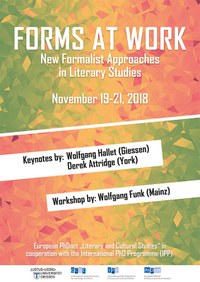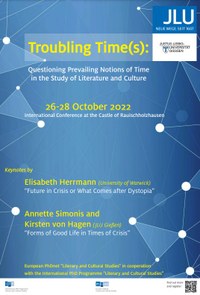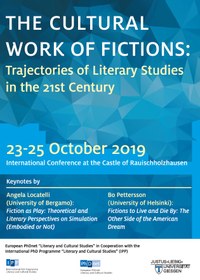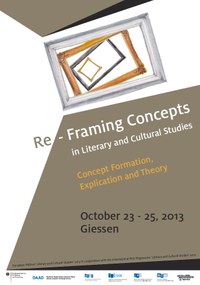Conferences
Over the years, the IPP has organized conferences on multiple topics, which allowed the members of the programme and PhD candidates all over the world to present and improve their own research, as well as to learn from international professors who held keynotes on the current developments of cultural and literary studies.
Forms at Work: New Formalist Approaches in Literary Studies
19-20.11.2018, GCSC Building
Responding to widespread critical assessments that formal analyses must move beyond traditional formalist and narratological approaches that either disregard or oversimplify the socio-political dimensions of a text, this international conference was intended to explore the methods, concepts, and theoretical frameworks employed in new formalist approaches to literary and cultural analysis.
The conference provided a forum for discussing how forms "constrain," "differ," "overlap and intersect," "travel," and "do political work in particular historical contexts," to borrow from Caroline Levine's outline of "five influential ideas about how forms work" in her book Forms (2015: 4-5). Presentations and keynote lectures critically engaged with new formalist methods of interpretation and read form in terms of its socio-political dimensions.
The conference is jointly organized by the International PhD Programme "Literary and Cultural Studies" (IPP) and the European PhDnet "Literary and Cultural Studies", and it had keynote lectures by Prof. Dr. Wolfgang Hallet (JLU) and Prof. Dr. Derek Attridge (Albert-Ludwigs-Universität Freiburg).
To see the programme of the conference, click here.
Organized in cooperation with the PhDnet
Troubling Time(s): Questioning Prevailing Notions of Time in the Study of Literature and Culture (PhDnet Final Conference - Fifth Cycle)
26-28.10.2022, Rauischholzhausen
Hamlet's lament that "the time is out of joint" is likely the most famous instance within the Western literary canon in which a moment of crisis, both personal and political, is linked to a sense of disrupted time. The pairing of troubling times with troubled time – i.e. ruptured, disjointed temporalities and historical breaks – certainly persists within contemporary experience and cultural expression.
The aim of this conference is to draw attention to the important insights offered by the study of literature and culture to this topic. The contributions reflect on linkages between troubling times of crisis and the troubling of time from literary and cultural studies perspectives. The idea of troubling something in an active way is used to connote moments of subversion, rethinking, empowerment, creativity, and perhaps even hope.
The conference included keynote lectures by Prof. Dr. Elisabeth Herrmann (University of Warwick), Prof. Dr. Annette Simonis (JLU) and Prof. Dr. Kirsten von Hagen (JLU).
To see the programme of the conference, click here.
The Cultural Work of Fictions: Trajectories of Literary Studies in the 21st Century (PhDnet Final Conference - Fourth Cycle)
23-25.10.2019, Rauischholzhausen
Discussing fictions in the plurivalent sense of literary fiction and socio-cultural fictions that societies live by, this conference engaged in debates on the value of fictions and discussed the trajectories of literary and cultural studies in the 21st century. Literary, as well as socio-cultural fictions, engage in important cultural work. As Yuval Noah Harari diagnoses, fiction(s) might be the "most potent force" in our time and age (2016: 151).
Distancing itself from an apologetic position in the "legitimation crisis" of literary studies that merely defends fictions in the face of attacks and criticisms against the humanities (Felski 2015: 5), this conference sought to direct attention to the "affordances" (Levine 2015) of fictions as well as literary studies and its trajectories.
The conference had keynote lectures by Prof. Dr. Bo Pettersson (University of Helsinki) and Prof. Dr. Angela Locatelli (University of Bergamo).
To see the programme of the conference, click here.
Re-Framing Concepts in Literary and Cultural Studies: Concept Formation, Explication and Theory (PhDnet Final Conference - Second Cycle)
23-25.10.2013, GCSC Building
Concepts are indispensable tools for the study of literature and culture. Far from serving only heuristic purposes, approaches and concepts in literary and cultural studies fulfil a range of important functions: Firstly, concepts are historically determined cultural constructs that are both shaped by the theories and cultures out of which they emerged and, in turn, shape them. Besides their cultural function, concepts are cognitive devices, and models for thought that help to structure and order the analysis of literary texts and cultural artefacts.
The ongoing trend toward internationalization and globalization in the humanities, the move toward greater interdisciplinarity as well as the growing influence of intermedialization processes on literary/cultural products and practices have involved a constant (re-)framing of concepts, theories, models and methods used.
The 2013 PhDnet 'Literary and Cultural Studies' conference, organized in cooperation with the International PhD Programm 'Literary and Cultural Studies', sought to investigate these (re-)framings. The conference included keynote lectures by Prof. Dr. Ansgar Nünning (JLU), Prof. Dr. Elisabeth Wåghäll Nivre (Stockholm University) and Prof. Dr. Peter Hanenberg (Catholic University of Portugal).
To see the programme of the conference, click here.




